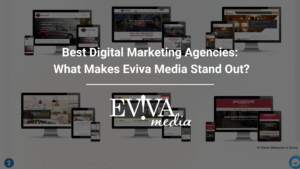There are two viable ways to promote your company brand. Traditional marketing is tried and true, while some think it’s going the way of the dinosaur. Digital marketing is becoming common on a global level, touching most of the world’s population. To discern which is best for your business, these approaches need to be defined.
Traditional Marketing – More than Flyers & Newspaper Ads
Traditional marketing looks for customers. It brands your logo, products, and services through a one-way communication from your company to the public at large, aka, outbound advertising. It utilizes tangible items such as billboards, banners, and posters, print ads/articles in newspapers, magazines, and local newsletters, business cards, brochures, direct mail, promotional gifts, and product samples. It also includes commercials for TV and radio, expositions, live product demonstrations, events, referrals, and other forms of networking which build personal rapport. Traditional marketing is far from dead and includes literally every way of promoting your business which isn’t done digitally.
Digital Marketing – Not Just for Millennials
Digital marketing continues to evolve and grow as technology advances. Digital marketing uses the internet to focus on helping customers find businesses. This promotes more interaction with potential customers, aka inbound advertising. Instead of simply telling people you are the best company, you give them reasons to trust your brand and allow customers to seek out your company. Often, customers become followers who participate in promoting your brand. Examples of digital marketing include social media, email, websites, content marketing, search engines & SEO, blogs and articles, digital magazines and other news, videos (YouTube), and podcasts, all with digital ads and promotions.
Pros and Cons of Traditional and Digital Marketing
Knowing the pros and cons of each type of marketing can help you determine how to create your marketing plan. Your brand may do better with one or the other, or more likely, a customized combination of the two.
Traditional Marketing – Pros
- Longevity – The public has been exposed to it for their entire lives, often without realizing what they’re reading or seeing is advertising. It’s familiar, so they tend to accept it, especially older customers.
- Local audiences – A brick and mortar local business must have a respected presence in their own community and traditional marketing does that well.
- Easy to understand – Business owners and customers alike have less trouble understanding how to access and process traditional marketing tools.
- Better recall of branding – Studies show paper marketing has higher tracking with customers from a visual and brain pattern perspective. Subjects will look more at hard copy information and retain more about your brand than they will digital ads because hard copies require less cognitive energy to process.
Traditional Marketing – Cons
- Local audiences – This strength is also a weakness. The reach of traditional marketing is far less broad or expansive. If a traditionally marketed company’s product or service extends beyond their immediate location, they are at a distinct disadvantage from other competitors who have an online digital presence.
- Cost – Traditional marketing is much more costly, especially for mass communication, such as TV or radio ads. Print media can also be more expensive and must be stored and disseminated. Cost is added when companies must hire additional people to distribute and manage these resources.
Digital Marketing – Pros
- Targeted audiences – Digital marketing allows businesses to focus their resources and energy on specific customers who will be interested in their products and services.
- Searches – This is a significant advantage considering over 80% of the US population is actively online, with a high percentage using their mobile devices to find services and products at any given time. Your company showing up toward the top of a search is extremely useful in connecting you with customers.
- Digital Networking – There is nothing like developing relationships with your customers before they might need your services. Social media and other digital formats, used properly, can make your brand accessible and known to the general online public.
- Customer engagement – Related to digital networking, being able to engage your customers in your promotions, articles, and contests over a digital platform is powerful. It’s common for followers on social media to voluntarily create promotional content for your company, or at least forward your links, themselves.
- Cost – Many digital platforms are free, including social media and search participation. Digital ads, positioning for searches, and boosting posts can be done relatively cheaply, compared to the cost of most traditional marketing tools.
- 24/7 availability – The internet is always open, so your online store can also be. Articles and social media don’t go away after hours and companies can schedule posts to accommodate customers’ lifestyles.
- Easy publicity – Anyone can post anywhere and at anytime on a variety of platforms. Companies easily reach followers on a moment’s notice.
Digital Marketing – Cons
- Feedback – Positive feedback is great, but negative feedback is often damaging to an online business.
- Expertise – Digital marketing can have a higher learning curve for both customers and businesses.
- Search Engine & Social Media Rules – Some regulations from search engines and social media platforms can interfere with your branding and visibility; however there are ways to deal with both.
Eviva Media understands how to integrate various marketing components to customize an effective and affordable business marketing plan. Contact us to schedule a consultation regarding what types of marketing tools might help bring your brand to the next level.




